Studies on Paul's Cultural Background (5 vols.)
Digital Logos Edition
Overview
From his personal history and context to his faith, teachings and resounding influence on Christianity, gain an in-depth view of the Apostle Paul. In these volumes, renowned scholars examine Paul’s life and beliefs in new ways, which shed light onto the life of a man whose impact is still felt today. Join them as they dig into Paul’s Jewish faith and lifestyle, his conversion, and his illuminating insights into the teachings of Christ.
Learn more about Paul with the Pauline Studies Library (35 vols.)!

Key Features
- Explores Paul’s beliefs and background
- Gives insight into Paul’s views on a variety of topics
- Examines the influence of his background on his teachings
Product Details
- Title: Studies on Paul's Cultural Background
- Publisher: Fortress Press
- Volumes: 5
- Pages: 1,740
- Resource Type: Collected Essays
- Topic: Pauline Studies
Individual Titles
- Paul within Judaism: Restoring the First-Century Context to the Apostle edited by Mark D. Nanos and Magnus Zetterholm
- Paul and the Politics of Diaspora by Ronald Charles
- Paul the Jew: Rereading the Apostle as a Figure of Second Temple Judaism edited by Gabriele Boccaccini and Carlos A. Segovia
- Paul and the Stories of Israel: Grand Thematic Narratives in Galatians by A. Andrew Das
- Paul and the Apocalyptic Imagination edited by Ben C. Blackwell, John K. Goodrich and Jason Maston (Editor)
This title is included in the following collections
You can save when you purchase this product as part of a collection.
2025 Collector's Edition Libra...
$10,999.99$8,249.992025 Ultimate Library
$23,999.99$17,999.99
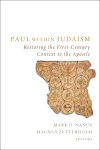
In these chapters, a group of renowned international scholars seek to describe Paul and his work from “within Judaism,” rather than on the assumption, still current after thirty years of the “New Perspective,” that in practice Paul left behind aspects of Jewish living after his discovery of Jesus as Christ (Messiah).
After an introduction that surveys recent study of Paul and highlights the centrality of questions about Paul’s Judaism, chapters explore the implications of reading Paul’s instructions as aimed at Christ-following non-Jews, teaching them how to live in ways consistent with Judaism while remaining non-Jews. The contributors take different methodological points of departure: historical, ideological-critical, gender-critical, and empire-critical, and examine issues of terminology and of interfaith relations. Surprising common ground among the contributors presents a coherent alternative to the “New Perspective.” The volume concludes with a critical evaluation of the Paul within Judaism perspective by Terence L. Donaldson, a well-known voice representative of the best insights of the New Perspective.
Mark D. Nanos is lecturer at the University of Kansas and author of The Mystery of Romans and The Irony of Galatians.
Magnus Zetterholm is associate professor in New Testament studies at Lund University and author of Approaches to Paul: A Student’s Guide to Recent Scholarship and The Formation of Christianity in Antioch; he edited The Messiah: In Early Judaism and Christianity.
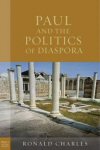
It is common knowledge that Paul was a Jew of the Hellenistic Diaspora, but how does that observation help us to understand his thinking, his self-identification, and his practice? Ronald Charles applies the insights of contemporary diaspora studies to address much-debated questions about Paul’s identity as a diaspora Jew, his complicated relationship with a highly symbolized “homeland,” the motives of his daily work, and the ambivalence of his rhetoric.
Charles revisits three well-trodden Pauline sites (the Antioch incident, Paul’s mission to the nations, and the collection project) and presents us with a provocative fresh description of what we had thought to be familiar terrain. Stimulating and warmly recommended.
—Terence L. Donaldson, Lord and Lady Coggan Professor of New Testament, Wycliffe College, University of Toronto
Ronald Charles is assistant professor at St. Francis Xavier University in Antigonish, Nova Scotia, Canada. He earned his PhD in early Christianity from the University of Toronto.
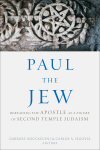
The decades-long effort to understand the apostle Paul within his Jewish context is now firmly established in scholarship on early Judaism, as well as on Paul. The latest fruit of sustained analysis appears in the essays gathered here, from leading international scholars who take account of the latest investigations into the scope and variety present in Second Temple Judaism.
Contributors address broad historical and theological questions—Paul’s thought and practice in relationship with early Jewish apocalypticism, messianism, attitudes toward life under the Roman Empire, appeal to Scripture, the Law, inclusion of Gentiles, the nature of salvation, and the rise of Gentile-Christian supersessionism—as well as questions about interpretation itself, including the extent and direction of a “paradigm shift” in Pauline studies and the evaluation of the Pauline legacy. Paul the Jew goes as far as any effort has gone to restore the apostle to his own historical, cultural, and theological context, and with persuasive results.
Gabriele Boccaccini is professor of Second Temple Judaism and Christian origins at the University of Michigan, Ann Arbor, Michigan, and the founder of the Enoch Seminar.
Carlos A. Segovia is lecturer in Islamic studies at Saint Louis University and associate professor in religious studies at Camilo José Cela University in Madrid.
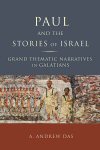
Much recent scholarship on Paul has searched for implicit narratives behind Paul’s scriptural allusions, especially in the wake of Richard B. Hays’ groundbreaking work on the apostle’s appropriation of Scripture. A. Andrew Das reviews six proposals for “grand thematic narratives” behind the logic of Galatians—potentially, six explanations for the fabric of Paul’s theology: the covenant (N. T. Wright); the influx of nations to Zion (Terence Donaldson); Isaac’s near sacrifice (Scott Hahn, Alan Segal); the Spirit as cloud in the wilderness (William Wilder); the Exodus (James Scott, Sylvia Keesmaat); and the imperial cult (Bruce Winter et al.).
Das weighs each of these proposals exegetically and finds them wanting—more examples of what Samuel Sandmel famously labeled “parallelomania” than of sound exegetical method. He turns at last to reflect on the risks of (admittedly alluring) totalizing methods and lifts up a seventh proposal with greater claim to evidence in the text of Galatians: Paul’s allusions to Isaiah’s servant passages.
A. Andrew Das is a professor of religious studies at Elmhurst College, Elmhurst, Illinois. He is the author or editor of seven books, including Galatians (2014), Solving the Romans Debate (Fortress Press, 2007), Paul and the Jews (2003), and Paul, the Law and the Covenant (2001).
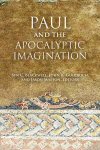
Since the mid-twentieth century, apocalyptic thought has been championed as a central category for understanding the New Testament writings and the letters of Paul above all. But “apocalyptic” has meant different things to different scholars. Even the assertion of an “apocalyptic Paul” has been contested: does it mean the invasive power of God that breaks with the present age (Ernst Käsemann), or the broader scope of revealed heavenly mysteries, including the working out of a “many-staged plan of salvation” (N. T. Wright), or something else altogether? Paul and the Apocalyptic Imagination brings together eminent Pauline scholars from diverse perspectives, along with experts of Second Temple Judaism, Hellenistic philosophy, patristics, and modern theology, to explore the contours of the current debate.
Contributors discuss the history of what apocalypticism, and an “apocalyptic Paul,” have meant at different times and for different interpreters; examine different aspects of Paul’s thought and practice to test the usefulness of the category; and show how different implicit understandings of apocalypticism shape different contemporary presentations of Paul’s significance.
Ben C. Blackwell is assistant professor of Christianity at Houston Baptist University and the author of Christosis: Pauline Soteriology in Light of Deification in Irenaeus and Cyril of Alexandria (2011).
John K. Goodrich is assistant professor of Bible at Moody Bible Institute and the author of Paul as an Administrator of God in 1 Corinthians (2012).
Jason Maston is assistant professor of theology at Houston Baptist University, and the editor, with Michael F. Bird, of Earliest Christian History: History, Literature, and Theology; Essays from the Tyndale Fellowship in Honor of Martin Hengel (2012); and the author of Divine and Human Agency in Second Temple Judaism and Paul: A Comparative Approach (2010).